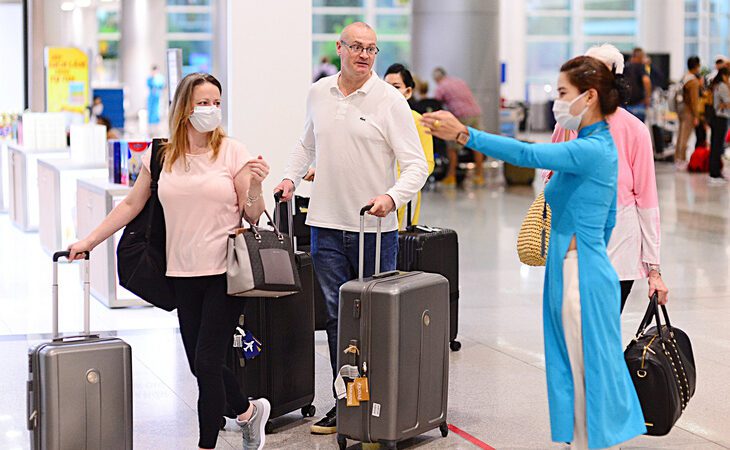Are you a Canadian wanderlust with dreams of venturing into the vibrant beauty of Vietnam? Well, get ready to embark on an adventure like no other! But before you can immerse yourself in the mesmerizing landscapes and rich culture, there’s one crucial step to conquer: obtaining your Vietnam visa. Fear not, fellow Canucks! In this comprehensive blog post, we’ll unravel the intricate process and guide you through every step towards securing your ticket to Vietnamese bliss. So put on your explorer hat and let’s dive deep into the world of visas – specifically tailored for our beloved Canadian travelers! VIETNAM VISA FOR CANADIAN CITIZENS
Introduction: Why is a visa required for Canadian citizens to visit Vietnam?
Vietnam is a fascinating Southeast Asian country known for its rich culture, stunning landscapes, and delicious cuisine. It has become an increasingly popular destination for travelers from all over the world, including Canadians. However, if you are a Canadian citizen planning to visit Vietnam, it is important to understand that you will need a valid visa to enter the country.
One of the main reasons why Canadian citizens require a visa to visit Vietnam is due to the diplomatic relations between the two countries. Canada and Vietnam do not have a reciprocal agreement that allows citizens of each country to travel freely without obtaining a visa beforehand. This means that even though Vietnamese citizens can enter Canada without a visa for short stays under 90 days, Canadians are not granted the same privilege when visiting Vietnam.
Another reason why Canadian citizens need a visa to enter Vietnam is because it helps regulate and control tourism in the country. As tourism continues to grow in Vietnam, with more and more visitors flocking to its shores each year, there is an increased need for proper management and monitoring of foreign visitors. The Vietnamese government requires all foreigners entering their country to obtain visas as part of their effort to ensure security and safety for both tourists and locals.
Additionally, having a visa requirement also serves as proof of entry purpose into Vietnam. A valid visa shows that you have been approved by the Vietnamese government and have met their entry requirements such as having sufficient funds or proof of accommodation during your stay. This helps prevent individuals from entering the country with malicious intent or overstaying their permitted duration. VIETNAM VISA FOR INDIAN PASSPORT HOLDERS
It should also be noted that there are different types of visas available depending on your purpose of travel. For example, if you plan on going on vacation or visiting family/friends in Vietnam, you would need a tourist visa. If you are traveling for business purposes or attending conferences/meetings in Vietnam, then you would require a business visa. Each type of visa has its own specific requirements and fees, so it is important to determine your purpose of travel before applying for a visa.
Canadian citizens need a valid visa to enter Vietnam as part of the country’s diplomatic relations with Canada, tourism management efforts, and proof of entry purpose. Understanding the reasons behind this requirement can help make the visa application process smoother and ensure a hassle-free trip to Vietnam. In the next section, we will discuss in detail the different types of visas available for Canadians and how to obtain them.
Understanding the Vietnam Visa Process
The process of obtaining a visa for Vietnam can seem daunting and confusing, especially for Canadians who may not be familiar with the country’s specific requirements. However, with the right understanding and preparation, obtaining a Vietnam visa can be a straightforward and stress-free process.
Firstly, it is important to determine which type of visa is required for your trip to Vietnam. For Canadian citizens planning on visiting Vietnam for tourism or business purposes, there are two main options: the e-visa or the traditional visa on arrival.
The e-visa is an electronic visa that allows travelers to enter Vietnam through any of its designated ports of entry. This option offers convenience as it eliminates the need to visit an embassy or consulate in person. The application process is done entirely online and takes approximately 3 days to process. It also has a validity period of 30 days from the date of entry into Vietnam, making it ideal for short-term trips.
On the other hand, those planning on staying in Vietnam for longer periods or conducting activities such as studying or working will need to apply for a traditional visa on arrival. This requires applicants to obtain an approval letter from the Vietnamese Immigration Department before arriving at one of their designated airports. The approval letter must be presented upon arrival along with other necessary documents such as a completed entry/exit form and passport photos.
To obtain an approval letter, applicants can either apply directly through the Vietnamese Immigration Department’s website or go through a reputable travel agency that offers this service. It typically takes around 5-7 business days for approval letters to be issued and they are valid for up to 90 days from the date of issue.
Aside from determining which type of visa is needed, there are also general requirements that all applicants must meet regardless of their chosen method. These include having at least six months’ validity remaining on your passport from your date of entry into Vietnam and having blank pages available in your passport for stamping.
It is also important to note that visa requirements and processes can change at any time, so it is always best to consult with the Vietnamese embassy or consulate in Canada for the most up-to-date information before applying.
Understanding the Vietnam visa process involves determining which type of visa is needed, gathering all necessary documents, and following the appropriate application procedures. By being well-informed and prepared, Canadians can easily navigate through the visa process and enjoy their trip to Vietnam without any complications.
Types of visas available for Canadian citizens
As a Canadian citizen, there are several types of visas available for travel to Vietnam. The type of visa you will need depends on the purpose and duration of your stay in the country.
1. Tourist Visa: This is the most common type of visa for Canadians traveling to Vietnam for leisure or sightseeing purposes. It allows you to stay in the country for up to 30 days and can be extended once for an additional 30 days. To apply for a tourist visa, you will need a valid passport with at least six months validity remaining, a completed application form, two passport-sized photos, and the required fee.
2. Business Visa: If you are traveling to Vietnam for business purposes such as attending conferences or meetings, you will need a business visa. This allows you to stay in the country for up to 90 days and can also be extended if necessary. In addition to the requirements mentioned above, you will also need an invitation letter from your Vietnamese business partner or company.
3. Work Visa: For Canadians who wish to work in Vietnam, a work visa is required. This type of visa is usually applied for by your employer in Vietnam and allows you to stay in the country long-term (up to two years). In addition to the basic requirements, you will also need a copy of your employment contract and other documents related to your job offer.
4. Student Visa: If you plan on studying in Vietnam for more than three months, then a student visa is necessary. You will need an acceptance letter from a recognized educational institution in Vietnam along with all other standard requirements mentioned above.
5. Transit Visa: If Canada is not your final destination and you have a layover in Vietnam before continuing on your journey, then a transit visa may be required depending on how long your layover is and whether or not you plan on leaving the airport during that time.
It’s important to note that these are the most common types of visas for Canadians, but there may be other specific categories depending on your circumstances. It’s best to do thorough research or consult with the nearest Vietnamese embassy or consulate to determine which visa type is suitable for your specific travel plans.
Obtaining a visa as a Canadian citizen depends on the purpose and length of your stay in Vietnam. Make sure to have all necessary documents and information ready before applying for a visa to avoid any delays or complications during the process. With proper preparation, you can easily obtain a visa and embark on your journey to explore the beautiful country of Vietnam.
Visa application requirements and procedures
Visa application requirements and procedures can often seem like a daunting and overwhelming task, especially when planning for international travel. However, the process of obtaining a Vietnam visa for Canadians is straightforward and can be easily navigated with the right information.
The first step in applying for a Vietnam visa is to determine which type of visa you will need. As a Canadian citizen, you have three options: e-visa, Visa on Arrival (VOA), or applying directly at the Vietnamese embassy or consulate in Canada. Each option has its own set of requirements and procedures, so it is important to select the one that best suits your needs.
For an e-visa, applicants must have a valid passport with at least six months validity remaining, a digital photo (2×2 inches), and a valid email address. The entire application process is done online through the official Vietnamese government website and typically takes 3-5 business days to process. Once approved, travelers simply print out their e-visa approval letter and present it upon arrival in Vietnam.
Alternatively, travelers can choose to obtain a VOA by applying through an authorized agency in Vietnam prior to departure. This option requires travelers to fill out an online application form with personal information such as name, date of birth, passport details, etc. In addition to this form, applicants must also submit two passport-sized photos (4x6cm) taken within six months prior to the application date and pay the processing fee upon arrival at one of Vietnam’s international airports.
Individuals may also apply for their visa directly through the nearest Vietnamese embassy or consulate in Canada. This involves filling out an application form obtained from their office website or in-person at their office location along with providing supporting documents such as passport copies and photos. The processing time varies depending on the specific embassy or consulate but generally takes around 3-7 business days.
In addition to these general requirements and procedures for all types of visas, it is important to note that Canadians must also have a valid return ticket and proof of sufficient funds for their stay in Vietnam. It is recommended to also have a hotel reservation or invitation letter from a Vietnamese sponsor.
The visa application process for Canadians traveling to Vietnam may seem complex at first glance, but with the right information and preparation, it can be easily navigated. Be sure to carefully consider which type of visa best suits your needs and gather all necessary documents before applying. With these tips in mind, you can confidently embark on your journey to beautiful Vietnam!
Helpful resources for visa application assistance
For Canadians planning to travel to Vietnam, obtaining a visa is an essential step in the journey. The process of applying for a visa can seem daunting and overwhelming, especially for first-time travelers. However, there are numerous helpful resources available to assist with the visa application process and make it a smooth and stress-free experience.
1. Canadian Embassy in Vietnam
The Canadian Embassy in Vietnam is an excellent resource for Canadians seeking assistance with their visa application. They offer comprehensive information on the various types of visas available and the necessary requirements for each type. The embassy also provides detailed instructions on how to fill out the visa application form correctly and what documents are needed.
In addition, they have a list of authorized travel agencies that can assist with the application process, making it convenient for travelers who may not have access to a Vietnamese embassy or consulate in Canada.
2. Online Visa Application Services
There are many online services that offer assistance with obtaining a Vietnamese visa. These services allow applicants to fill out their application forms online and submit all required documents electronically, saving time and effort. They also provide guidance on which type of visa would be most appropriate based on the purpose of the trip.
Moreover, some online services offer expedited processing options at an additional fee for those who need their visas urgently.
3. Travel Agencies
Another helpful resource for obtaining a Vietnamese visa is through travel agencies. Many travel agencies specialize in arranging trips to Vietnam and have experience handling visa applications for their clients.
These agencies not only provide consultation services but can also handle all aspects of the application process, from filling out forms to submitting documents on behalf of their clients.
4. Discussion Forums and Blogs
Discussion forums and blogs are great sources of firsthand experiences from fellow travelers who have gone through the Vietnamese visa application process themselves. These platforms allow individuals to ask questions, share tips, and get advice from others who have already been through it.
By reading about other people’s experiences, travelers can gain a better understanding of the process and avoid any potential pitfalls during their own application.
Applying for a Vietnamese visa may seem like a daunting task, but with the help of these resources, Canadians can navigate through the process with ease. It is essential to do thorough research and seek assistance when needed to ensure a smooth and successful visa application.




